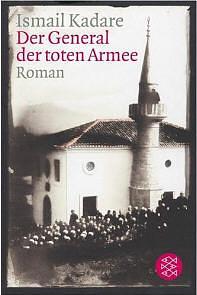Take a photo of a barcode or cover
digging.. digging.. digging graves!
this job bursts your heart and is sad enough to break your heart. it would have been better if they fought here, cause now he felt his heart so heavy that the whole world seemed to him as abandoned and as meaningless an that dark, empty stadium.
this job bursts your heart and is sad enough to break your heart. it would have been better if they fought here, cause now he felt his heart so heavy that the whole world seemed to him as abandoned and as meaningless an that dark, empty stadium.
challenging
dark
reflective
slow-paced
Plot or Character Driven:
A mix
Strong character development:
No
Loveable characters:
No
Diverse cast of characters:
No
Flaws of characters a main focus:
Yes
4,5/5 Een macaber meeslepend verhaal wat lijkt te gaan over een Italiaanse generaal maar stiekem een ode is aan het stoïcijnse verzet van de Albanezen. Tijdens het lezen voelde het alsof ik naast de generaal stond die in de stromende regen toekijkt hoe Albanese werklui de skeletten van zijn overleden soldaten uit hun tijdelijke graven ontaarden. Als de rest van zijn oeuvre net zo sterk is had hij wat mij betreft zeker de Nobelprijs moeten winnen. Een halve ster er af omdat tegen het einde de nationalistische trots van Kadare de spuigaten begint uit te lopen. Ook een geweldig boek voor iedereen die met een roman kennis wil maken met Albanië en hun bezetting tijdens de tweede wereldoorlog.
in my last review, I said that I needed to stop reading tragic and sad all related stories and yeah here I am. But I do think I enjoy this one more than the previous one. This one is set after World War II in Albania. A general from the Italian army is tasked with recovering hundreds of remains from the comrades who fell in the war in Albania so he's travelling around the country digging them up and packing them to send back to Italy. Although I am not familiar with the stuff that happened in Albania at all, the idea and the plot was still clear enough for me to understand.
I liked how stubborn the main character, the general, was. He refuses to believe that the Italian army lost the war despite being told by a quite literally everybody and seeing evidence of their defeats all around the Albanian countryside. He also refuses to believe that soldiers willingly deserted from the army despite the fact that he finds diaries and photographic evidence and tales of the deserters finding a more worthy life living in a farm or in a flour mill rather than serving in the army. I think this blindness is really what makes the story work so well.
There is also quite a lot of stereotyping and looking down on the Albanian people despite the fact that they are the ones who won. The priest describes them as basically savages and as loving war and disaster but actually that is very far from the truth. But again, this is the character of the priest speaking from his blindness and his unwillingness to open his eyes to see the reality and see that the people who created these disasters in Albania was actually Italy.
The only thing I wish were different is that at least some of the stories had a resolution to them. I was quite invested in what happened to some of the soldiers that went missing, such as the one who deserted and started working at a flour mill. Obviously I feel the realistic way to approach it is by having their stories with no end. So I am willing to accept that, but even then I found the ending was a little bit weird and it lost me. all in all a very moody read.
I liked how stubborn the main character, the general, was. He refuses to believe that the Italian army lost the war despite being told by a quite literally everybody and seeing evidence of their defeats all around the Albanian countryside. He also refuses to believe that soldiers willingly deserted from the army despite the fact that he finds diaries and photographic evidence and tales of the deserters finding a more worthy life living in a farm or in a flour mill rather than serving in the army. I think this blindness is really what makes the story work so well.
There is also quite a lot of stereotyping and looking down on the Albanian people despite the fact that they are the ones who won. The priest describes them as basically savages and as loving war and disaster but actually that is very far from the truth. But again, this is the character of the priest speaking from his blindness and his unwillingness to open his eyes to see the reality and see that the people who created these disasters in Albania was actually Italy.
The only thing I wish were different is that at least some of the stories had a resolution to them. I was quite invested in what happened to some of the soldiers that went missing, such as the one who deserted and started working at a flour mill. Obviously I feel the realistic way to approach it is by having their stories with no end. So I am willing to accept that, but even then I found the ending was a little bit weird and it lost me. all in all a very moody read.
dark
reflective
sad
medium-paced
Plot or Character Driven:
Character
Strong character development:
Yes
Loveable characters:
Complicated
Diverse cast of characters:
Yes
Flaws of characters a main focus:
Yes
reflective
sad
slow-paced
Plot or Character Driven:
Character
Strong character development:
No
Loveable characters:
No
Diverse cast of characters:
No
Flaws of characters a main focus:
Yes
emotional
reflective
medium-paced



